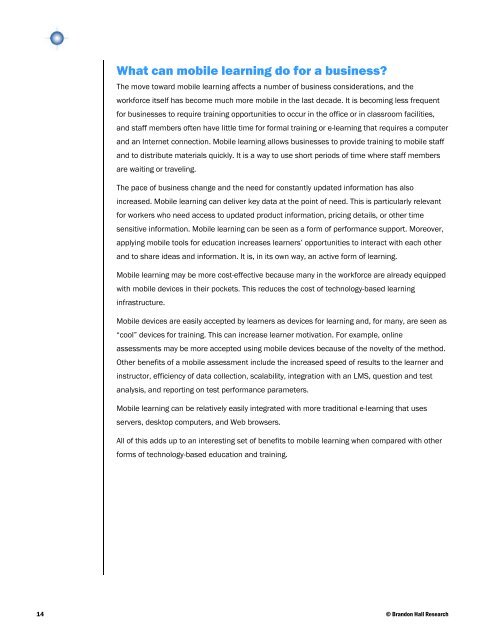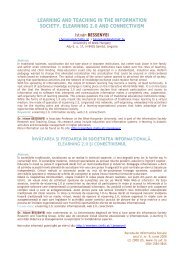Do not reproduce - Connected-Inge
Do not reproduce - Connected-Inge
Do not reproduce - Connected-Inge
You also want an ePaper? Increase the reach of your titles
YUMPU automatically turns print PDFs into web optimized ePapers that Google loves.
What can mobile learning do for a business?<br />
The move toward mobile learning affects a number of business considerations, and the<br />
workforce itself has become much more mobile in the last decade. It is becoming less frequent<br />
for businesses to require training opportunities to occur in the office or in classroom facilities,<br />
and staff members often have little time for formal training or e-learning that requires a computer<br />
and an Internet connection. Mobile learning allows businesses to provide training to mobile staff<br />
and to distribute materials quickly. It is a way to use short periods of time where staff members<br />
are waiting or traveling.<br />
The pace of business change and the need for constantly updated information has also<br />
increased. Mobile learning can deliver key data at the point of need. This is particularly relevant<br />
for workers who need access to updated product information, pricing details, or other time<br />
sensitive information. Mobile learning can be seen as a form of performance support. Moreover,<br />
applying mobile tools for education increases learners’ opportunities to interact with each other<br />
and to share ideas and information. It is, in its own way, an active form of learning.<br />
Mobile learning may be more cost-effective because many in the workforce are already equipped<br />
with mobile devices in their pockets. This reduces the cost of technology-based learning<br />
infrastructure.<br />
Mobile devices are easily accepted by learners as devices for learning and, for many, are seen as<br />
“cool” devices for training. This can increase learner motivation. For example, online<br />
assessments may be more accepted using mobile devices because of the novelty of the method.<br />
Other benefits of a mobile assessment include the increased speed of results to the learner and<br />
instructor, efficiency of data collection, scalability, integration with an LMS, question and test<br />
analysis, and reporting on test performance parameters.<br />
Mobile learning can be relatively easily integrated with more traditional e-learning that uses<br />
servers, desktop computers, and Web browsers.<br />
All of this adds up to an interesting set of benefits to mobile learning when compared with other<br />
forms of technology-based education and training.<br />
14 © Brandon Hall Research





